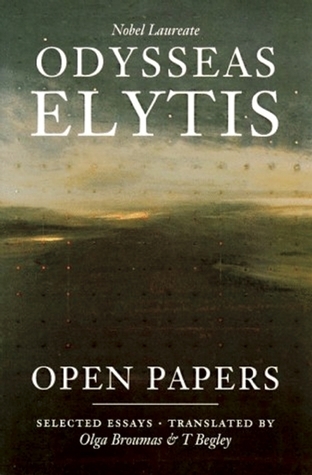What do you think?
Rate this book


200 pages, Paperback
First published January 1, 1974
“Wo aber die Gefahr ist, wächst,
Das Rettende auch.”“But where danger is,
salvation also blooms.” (96)
In a suite of poems based upon an imaginary conversation between an older man, ‘the Antiphonist,’ and a rebellious young woman, Maria Nephele, the poet utilizes a mathematical structure drawn from Pythagorean theories of harmony, the voices echoing the strophic/anti-strophic composition of ancient tragedies and liturgies. Perhaps this complex limpidity has contributed to his reputation as a poet of the cognoscenti and literati as opposed to, say, the more blue collar Yannis Ritsos. All agree, however, that he is one of the three great mountains of Greek modernism, along with George Seferis and Ritsos. (xi)
And yet from what is to what could be you cross a bridge that takes you, no more, no less, from Hell to Paradise. And more bizarre: a Paradise composed of the exact same material as Hell. The only difference is our perception of the material’s arrangement – more easily understood by imagining it applied to ethical and emotional architectures – yet it’s enough to pinpoint the immeasurable difference. If the reality created by people whose half-mast emotions and sensations disallow, now and perhaps forever, the other architecture or, in other words, the revolutionary re-synthesis, then, to my thinking, only the spirit is free and able to take it on. (6)
The splendor of youth is, to a point, the splendor of error. Jealous the old, who have everything previewed! The nightingale will never come sing over your wisdom. It won’t, darlin’, it won’t. (8)
Logic has rid us of the absurdity of our clothes. That’s progress, no irony, only now we are cold. Hale and ill trade bodies with unusual willingness, while in midair souls tangle. The young start out disgusted and Poetry is left to the memo-writers. (14)
This is why I write. Because poetry begins where death is robbed of the last word. (25)
Willing or not, we are all hostages of the joy of which we deprive ourselves. Here springs love’s pre-eternal sadness. (25)
I like to begin where winds shake the first branch. (30)
Coincidence, when raised to a symbol, occurs with mathematical precision at the most crucial moment, even for the squarest of minds. A moment the rest of us call higher will, Fate’s gesture, something like that. (31)
Forced relations between two things that superficially appear foreign create a new, instantaneous state. Authentic poetry asks nothing more. A kinship completely nonexistent moments ago was created by the poet’s authority, just as it might have been created in life by the authority of chance. (40)
…justice is a precise moment, nothing more. (46)
Poetry should express the apex, should consistute a kind of pioneering outpost in the unexplored area of life, should precede other arts in the depiction of sensitivity. It should be the word and sword intervening in the spirit, so that matter, docile, can follow. Creation, especially poetic, is above all a result. (85)
His problem was fundamentally the same as that exhibited today by most of the newer generation’s representatives. They insist on judging gold by color not by weight, oblivious to how easily everything can be painted gold, as easily as writing a book of poems a week, in which you paint everything black – do words cost anything? – and have the world admire. (107)
The sieve of conscience sorts and refines, sorts and refines everything until, one day, you feel as clean and transparent as your secret tendencies had always meant you to and not as your circumstances had conspired to alter. It is so difficult, so difficult to let your era mark but not counterfeit you. (120)
Some moments in human life reveal, by a quick imperceptible blink, the surrounding world bathed in strange light, stripped of daily meaning, and recognized by another and first-seen – the real one perhaps? – physiognomy. These are moments when the events that dryly and relentlessly define your way break their orbit, gleaming with different meaning and different goals, moments you suddenly see yourself on never-chosen trails, under strange arches of trees, among people who assume the stature of your most obvious emotions to become friends, your friends, as you had always wished them to exist and await you, there, in some bitter corner of your life. No alien element or supersensory presence explains the world’s bizarre turn in such moments. Simple, earthly, human, they are the actions and events that occur in a second circumstance, more real than the first, one we would distinguish by the name hyper-real. (166)